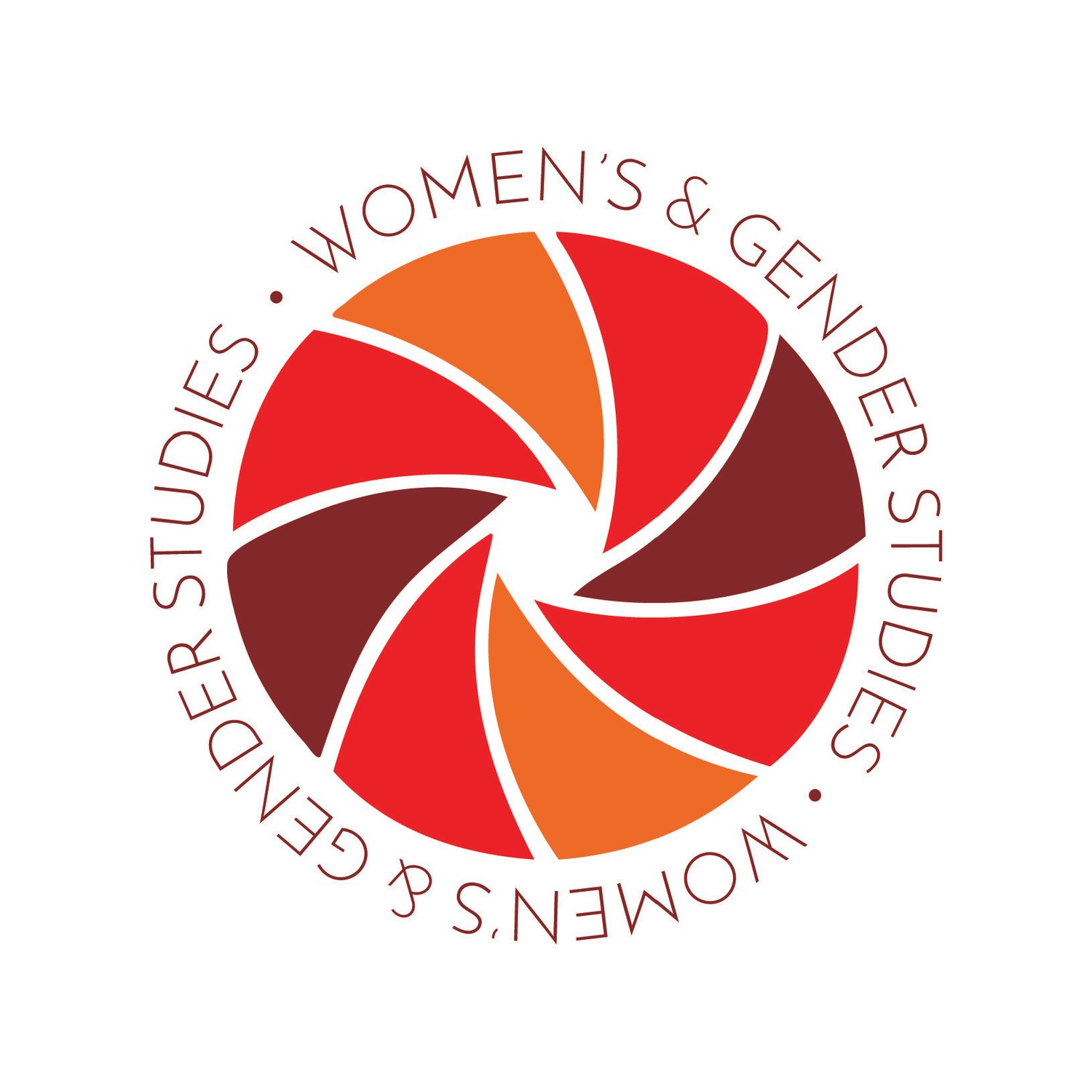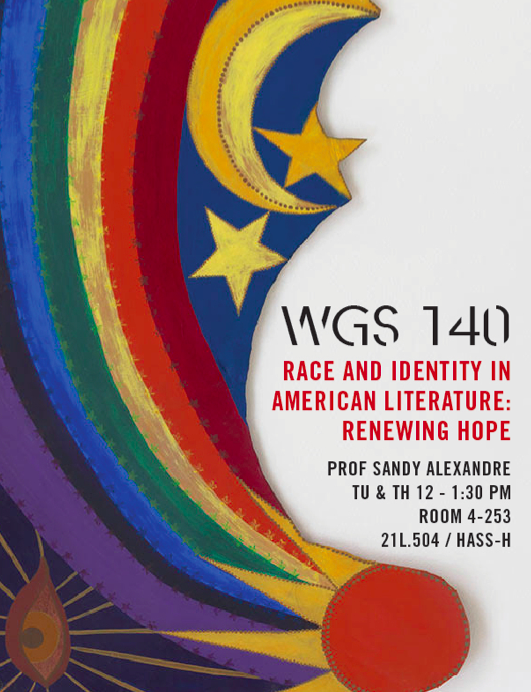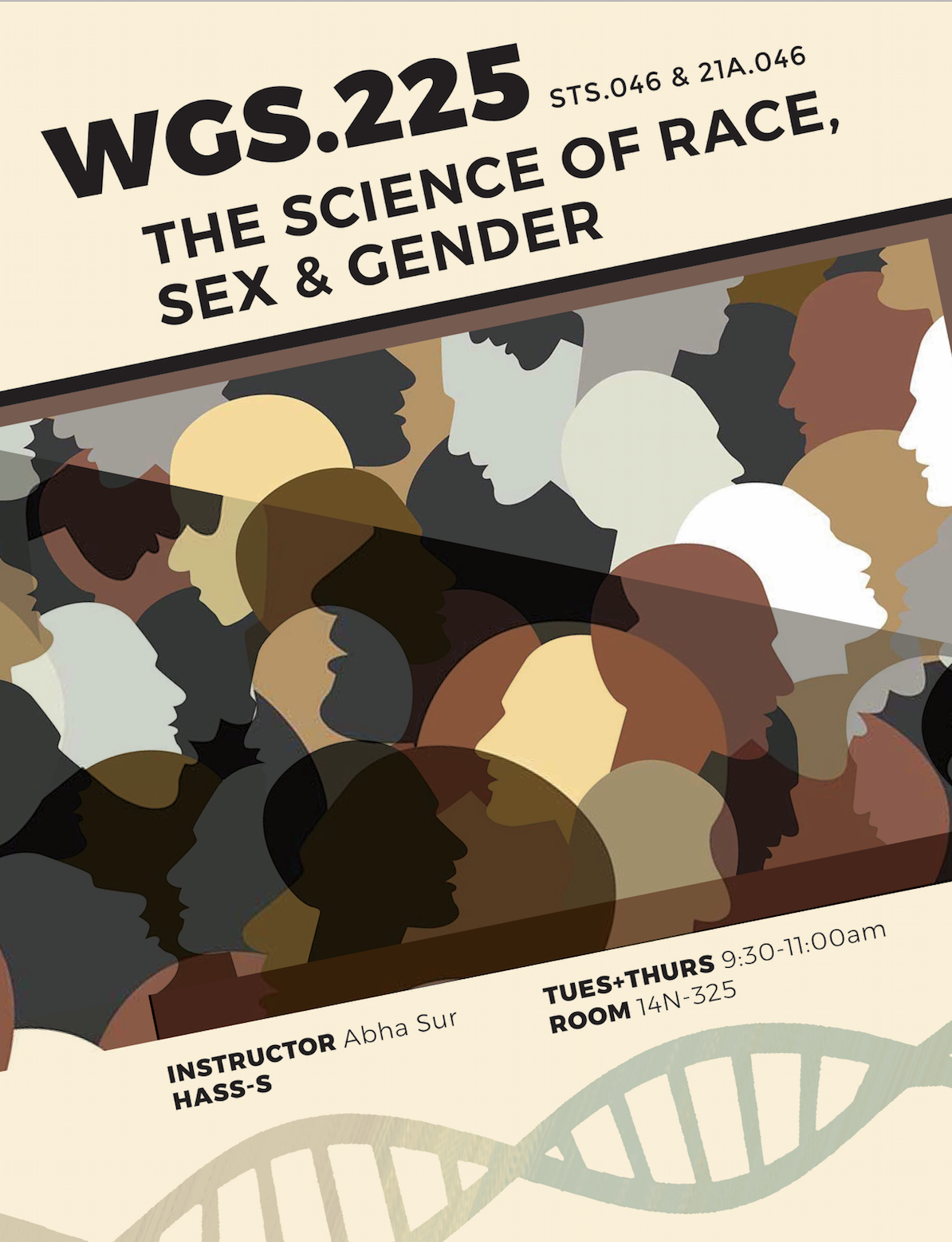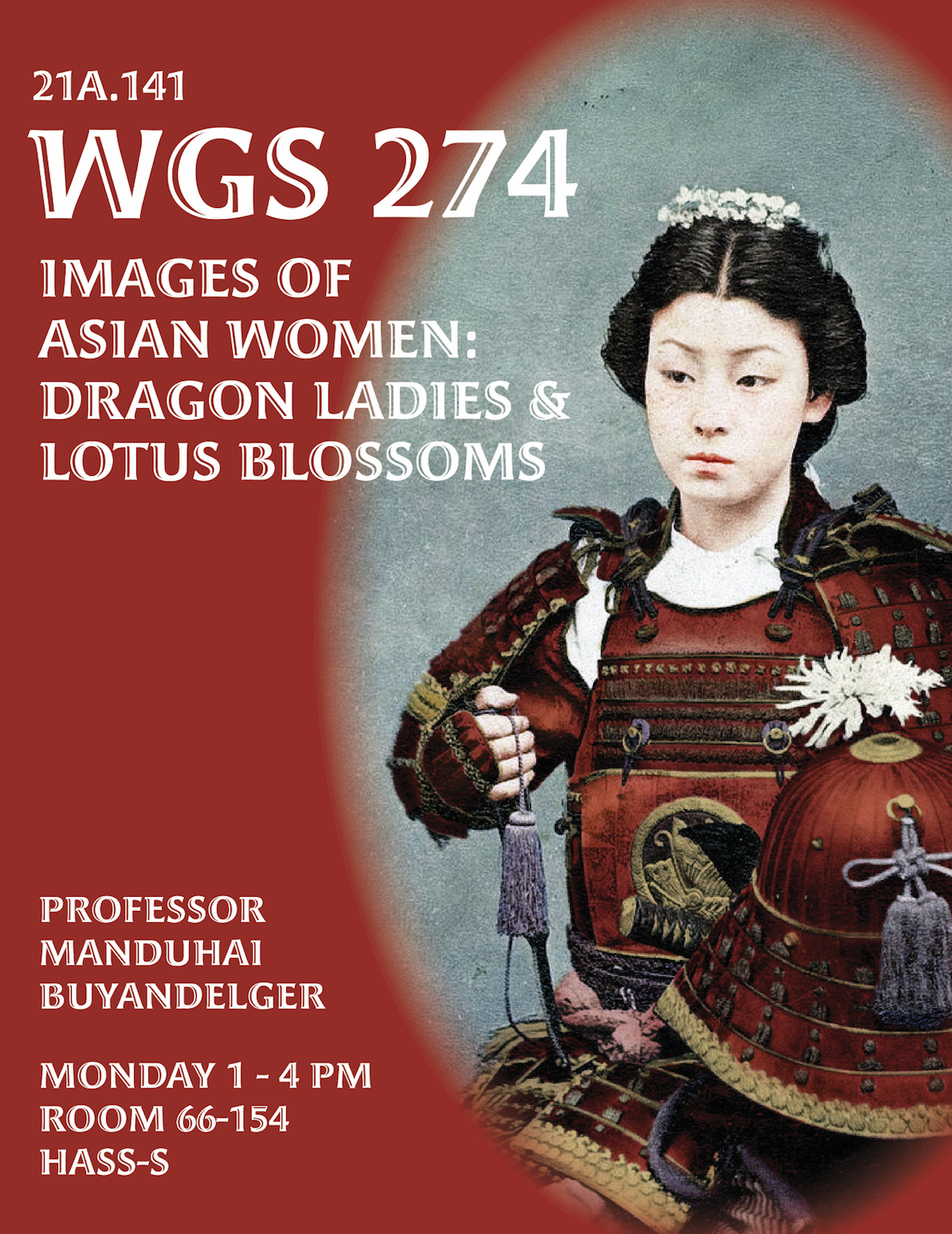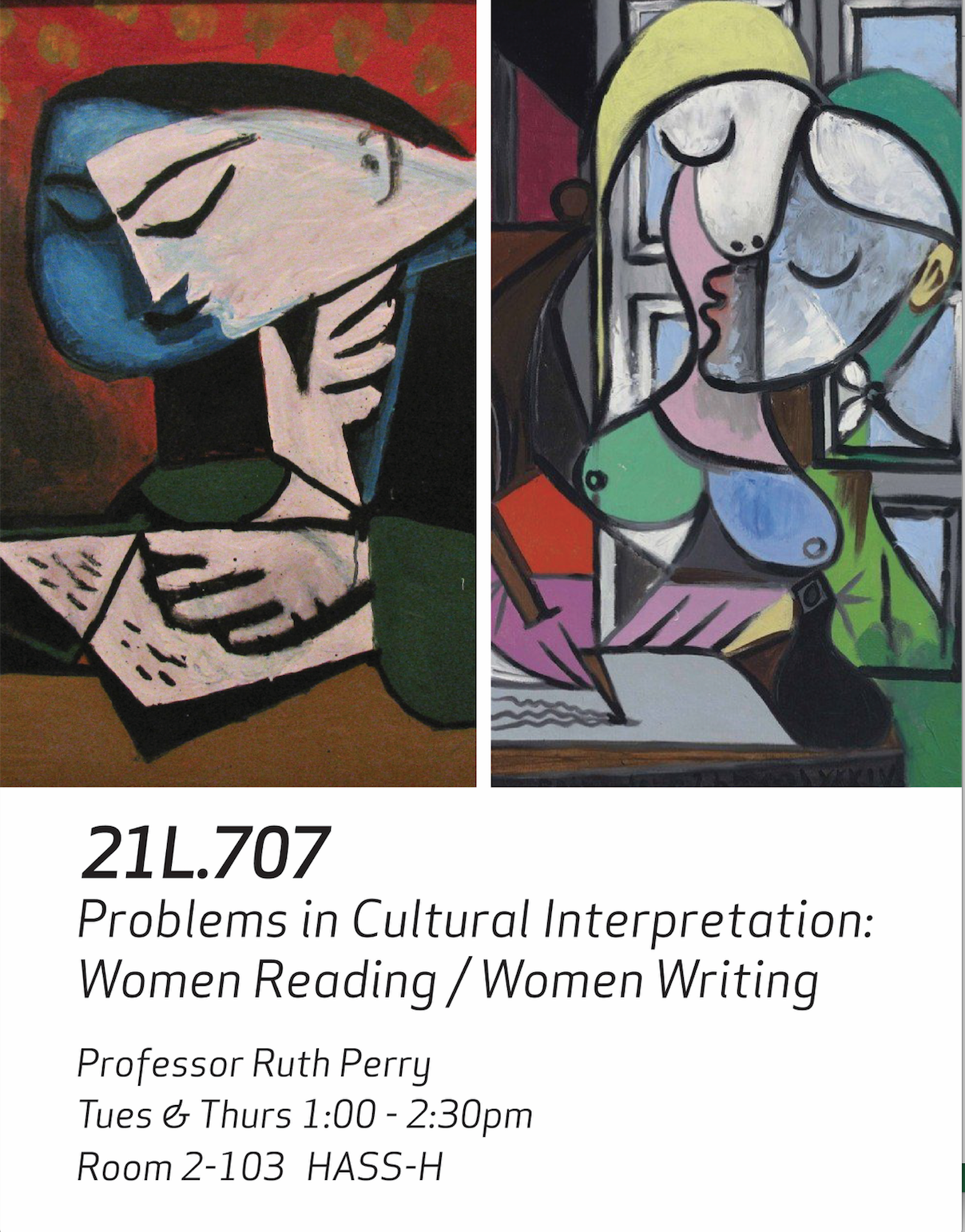WGS.140 Race and Identity in American Literature
Questions posed by the literature of the Americas about the relationship of race and gender to authorship, audience, culture, ethnicity, and aesthetics. Social conditions and literary histories that shape the politics of identity in American literature. Specific focus varies each term. Previously taught topics include Immigrant Stories, African American Literature, and Asian American Literature. May be repeated for credit with permission of instructor if the content differs.
HASS-H
S. Alexandre
HASS-H
Same subject as 21L.204J
Prereq: Permission of instructor
Units: 3-0-9
T TH 12 - 1:30pm
Room 4-253
Questions posed by the literature of the Americas about the relationship of race and gender to authorship, audience, culture, ethnicity, and aesthetics. Social conditions and literary histories that shape the politics of identity in American literature. Specific focus varies each term. Previously taught topics include Immigrant Stories, African American Literature, and Asian American Literature. May be repeated for credit with permission of instructor if the content differs.
S. Alexandre
WGS.172 For Love and Money: Rethinking the Family
Cross-cultural case studies introduce students to the anthropological study of the social institutions and symbolic meanings of family, gender, and sexuality. Investigates the different forms families and households take and considers their social, emotional, and economic dynamics. Analyzes how various expectations for, and experiences of, family life are rooted in or challenged by particular conceptions of gender and sexuality. Addresses questions surrounding what it means to be a "man" or a "woman," as well as a family member, in different social contexts.
HASS-S
H. Paxson
HASS-S
Same subject as 21A.111J
Prereq: None
Units: 3-0-9
T TH 11am - 12:30pm
Room 56-180
Cross-cultural case studies introduce students to the anthropological study of the social institutions and symbolic meanings of family, gender, and sexuality. Investigates the different forms families and households take and considers their social, emotional, and economic dynamics. Analyzes how various expectations for, and experiences of, family life are rooted in or challenged by particular conceptions of gender and sexuality. Addresses questions surrounding what it means to be a "man" or a "woman," as well as a family member, in different social contexts.
H. Paxson
WGS.190 Black Matters: Introduction to Black Studies
Interdisciplinary survey of people of African descent that draws on the overlapping approaches of history, literature, anthropology, legal studies, media studies, performance, linguistics, and creative writing. Connects the experiences of African-Americans and of other American minorities, focusing on social, political, and cultural histories, and on linguistic patterns. Includes lectures, discussions, workshops, and required field trips that involve minimal cost to students.
HASS-H, CI-H, HASS-A
M. DeGraff, D. Fox Harrell, D. Wood
HASS-H, CI-H, HASS-A
Same subject as 24.912J, 21H.106J, 21L.008J, 21W.741J
Prereq: None
Units: 3-0-9
T 2 - 5pm
Room 36-372
Interdisciplinary survey of people of African descent that draws on the overlapping approaches of history, literature, anthropology, legal studies, media studies, performance, linguistics, and creative writing. Connects the experiences of African-Americans and of other American minorities, focusing on social, political, and cultural histories, and on linguistic patterns. Includes lectures, discussions, workshops, and required field trips that involve minimal cost to students.
M. DeGraff, D. Fox Harrell, D. Wood
WGS.224 Race, Gender and Social Inequality: Reproductive Health Care in the United States
Explores the politics of reproductive health care delivery in the United States, with a particular focus on how clinical care is shaped by--and, in turn, shapes--social inequality along axes of race and gender. Considers a variety of reproductive health issues from multiple perspectives, drawing on readings from the fields of history, anthropology, sociology, medicine, epidemiology, and law. Develops skills to interrogate how each field conceptualizes and values reproductive health, both explicitly and implicitly. Introduces major conceptual issues foundational to understanding the politics of reproduction. Goes on to cover topics such as the human biofemale reproductive lifecycle and social movements explicitly organized around reproductive health. Limited to 40.
HASS-S
E. Janiak
HASS-S
Prereq: None
Units: 3-0-9
W 10am - 1pm
Room 4-253
Explores the politics of reproductive health care delivery in the United States, with a particular focus on how clinical care is shaped by--and, in turn, shapes--social inequality along axes of race and gender. Considers a variety of reproductive health issues from multiple perspectives, drawing on readings from the fields of history, anthropology, sociology, medicine, epidemiology, and law. Develops skills to interrogate how each field conceptualizes and values reproductive health, both explicitly and implicitly. Introduces major conceptual issues foundational to understanding the politics of reproduction. Goes on to cover topics such as the human biofemale reproductive lifecycle and social movements explicitly organized around reproductive health. Limited to 40.
E. Janiak
WGS.225 The Science of Race, Sex, and Gender
Examines the role of science and medicine in the origins and evolution of the concepts of race, sex, and gender from the 17th century to the present. Focus on how biological, anthropological, and medical concepts intersect with social, cultural, and political ideas about racial, sexual, and gender difference in the US and globally. Approach is historical and comparative across disciplines emphasizing the different modes of explanation and use of evidence in each field.
HASS-S
A. Sur
HASS-S
Same subject as 21A.103J, STS.046J
Prereq: None
Units: 3-0-9
T TH 9:30 - 11am
Room 14N-325
Examines the role of science and medicine in the origins and evolution of the concepts of race, sex, and gender from the 17th century to the present. Focus on how biological, anthropological, and medical concepts intersect with social, cultural, and political ideas about racial, sexual, and gender difference in the US and globally. Approach is historical and comparative across disciplines emphasizing the different modes of explanation and use of evidence in each field.
A. Sur
WGS.229 Race, Culture, and Gender in the US and Beyond: A Psychological Perspective
Examines the biopsychosocial factors which impact racial-ethnic identity, racial and cultural socialization, and experiences of prejudice, bias, discrimination, and racial microaggressions across gender identities. Reviews topics in multicultural psychology from the lens of challenging ethnocentric biases in the field. Critically evaluates the intersection of race with other social identities (e.g., gender, sexual identity, and socioeconomic status) and how it impacts human behavior. Using a case study approach, students integrate empirical evidence from international psychosocial research on oppression in order to provide more breadth in understanding the influence of race and gender upon human behavior. Develops multicultural competency skills essential for practice in clinical and non-clinical organizational settings. Limited to 25.
HASS-S
C. Kapungu
HASS-S
Prereq: None
Units: 3-0-9
TH EVE 7 - 10pm
Room 14E-310
Examines the biopsychosocial factors which impact racial-ethnic identity, racial and cultural socialization, and experiences of prejudice, bias, discrimination, and racial microaggressions across gender identities. Reviews topics in multicultural psychology from the lens of challenging ethnocentric biases in the field. Critically evaluates the intersection of race with other social identities (e.g., gender, sexual identity, and socioeconomic status) and how it impacts human behavior. Using a case study approach, students integrate empirical evidence from international psychosocial research on oppression in order to provide more breadth in understanding the influence of race and gender upon human behavior. Develops multicultural competency skills essential for practice in clinical and non-clinical organizational settings. Limited to 25.
C. Kapungu
WGS.245 Identities and Intersections: Queer Literatures
Focuses on LGBT literature from the mid-19 century to the present, with an emphasis on fiction and poetry. In particular, analyzes how LGBT identities and their literary representations have changed over time. Covers authors such as Walt Whitman, Oscar Wilde, Virginia Woolf, James Baldwin, Audre Lorde, Cherrie Moraga, Melvin Dixon, Leslie Feinberg, and Luis Negron.
HASS-H
J. Terrones
HASS-H
Same subject as 21L.480J
Prereq: None
Units: 3-0-9
MW EVE 7 - 8:30pm
Room 4-146
Focuses on LGBT literature from the mid-19 century to the present, with an emphasis on fiction and poetry. In particular, analyzes how LGBT identities and their literary representations have changed over time. Covers authors such as Walt Whitman, Oscar Wilde, Virginia Woolf, James Baldwin, Audre Lorde, Cherrie Moraga, Melvin Dixon, Leslie Feinberg, and Luis Negron.
J. Terrones
WGS.274 Images of Asian Women: Dragon Ladies and Lotus Blossoms
Explores some of the forces and mechanisms through which stereotypes are built and perpetuated. In particular, examines stereotypes associated with Asian women in colonial, nationalist, state-authoritarian, and global/diasporic narratives about gender and power. Students read ethnography, fiction, and history, and view films to examine the politics and circumstances that create and perpetuate the representation of Asian women as dragon ladies, lotus blossoms, despotic tyrants, desexualized servants, and docile subordinates. Students are introduced to debates about Orientalism, gender, and power.
HASS-S
M. Buyandelger
HASS-S
Same subject as 21A.141J, 21G.048J
Prereq: None
Units: 3-0-9
M 1- 4pm
Room 66-154
Explores some of the forces and mechanisms through which stereotypes are built and perpetuated. In particular, examines stereotypes associated with Asian women in colonial, nationalist, state-authoritarian, and global/diasporic narratives about gender and power. Students read ethnography, fiction, and history, and view films to examine the politics and circumstances that create and perpetuate the representation of Asian women as dragon ladies, lotus blossoms, despotic tyrants, desexualized servants, and docile subordinates. Students are introduced to debates about Orientalism, gender, and power.
M. Buyandelger
WGS.301 Feminist Thought
Analyzes theories of gender and politics, especially ideologies of gender and their construction; definitions of public and private spheres; gender issues in citizenship, the development of the welfare state, experiences of war and revolution, class formation, and the politics of sexuality. Graduate students are expected to pursue the subject in greater depth through reading and individual research.
HASS-H
E. Wood
HASS-H
Same subject as 17.007J, 24.237J
Subject meets with 17.006J, 24.637J
Prereq: None
Units: 3-0-9
MW 2:30 - 4pm
Room 14E-310
Analyzes theories of gender and politics, especially ideologies of gender and their construction; definitions of public and private spheres; gender issues in citizenship, the development of the welfare state, experiences of war and revolution, class formation, and the politics of sexuality. Graduate students are expected to pursue the subject in greater depth through reading and individual research.
E. Wood
21L.707 Problems in Cultural Interpretation: Women Reading/Women Writing
Studies the relation between imaginative texts and the culture surrounding them. Emphasizes ways in which imaginative works absorb, reflect, and conflict with reigning attitudes and world views. Instruction and practice in oral and written communication. Previously taught topics include Women Reading/Women Writing; Poetry, Passion, and the Self; and Race, Religion and Identity in Early Modern America. Approved for credit in Women's and Gender Studies for Spring 2020. (May be repeated for credit with permission of instructor if content differs). Limited to 12.
HASS-H
R. Perry
HASS-H
Prereq: Two subjects in Literature or permission of instructor
Units: 3-0-9
T TH 2:30 - 4pm
Room 2-103
Studies the relation between imaginative texts and the culture surrounding them. Emphasizes ways in which imaginative works absorb, reflect, and conflict with reigning attitudes and world views. Instruction and practice in oral and written communication. Previously taught topics include Women Reading/Women Writing; Poetry, Passion, and the Self; and Race, Religion and Identity in Early Modern America. Approved for credit in Women's and Gender Studies for Spring 2020. (May be repeated for credit with permission of instructor if content differs). Limited to 12.
R. Perry
WGS.160 Science Activism: Gender, Race, and Power
NEW CLASS!
Examines the role scientists have played as activists in social movements in the US following World War II. Themes include scientific responsibility and social justice, the motivation of individual scientists, strategies for organizing, the significance of race and gender, and scientists' impact within social movements. Case studies include atmospheric testing of nuclear weapons and the nuclear freeze campaign, climate science and environmental justice, the civil rights movement, Vietnam War protests, the March 4 movement at MIT, and concerns about genetic engineering, gender equality, intersectional feminism, and student activism at MIT.
E. Bertschinger
NEW CLASS!
HASS-E
MW 9:30 - 11AM
Room 1-246
Examines the role scientists have played as activists in social movements in the US following World War II. Themes include scientific responsibility and social justice, the motivation of individual scientists, strategies for organizing, the significance of race and gender, and scientists' impact within social movements. Case studies include atmospheric testing of nuclear weapons and the nuclear freeze campaign, climate science and environmental justice, the civil rights movement, Vietnam War protests, the March 4 movement at MIT, and concerns about genetic engineering, gender equality, intersectional feminism, and student activism at MIT.
E. Bertschinger
WGS.101 Introduction to Women's and Gender Studies
Drawing on multiple disciplines - such as literature, history, economics, psychology, philosophy, political science, anthropology, media studies and the arts - to examine cultural assumptions about sex, gender, and sexuality. Integrates analysis of current events through student presentations, aiming to increase awareness of contemporary and historical experiences of women, and of the ways sex and gender interact with race, class, nationality, and other social identities. Students are introduced to recent scholarship on gender and its implications for traditional disciplines.
A. Walsh
Prereq: None
Units: 3-0-9
MW 3 - 4:30pm
Room 4-145
HASS-H, CI-H
Drawing on multiple disciplines - such as literature, history, economics, psychology, philosophy, political science, anthropology, media studies and the arts - to examine cultural assumptions about sex, gender, and sexuality. Integrates analysis of current events through student presentations, aiming to increase awareness of contemporary and historical experiences of women, and of the ways sex and gender interact with race, class, nationality, and other social identities. Students are introduced to recent scholarship on gender and its implications for traditional disciplines.
A. Walsh
WGS.110 Sexual and Gender Identities
Provides an introduction to the history of gender, sex, and sexuality in the modern United States, from the end of the 19th century to the present. Surveys historical approaches to the field, emphasizing the changing nature of sexual and gender identities over time. Traces attempts to control, construct, and contain sexual and gender identities. Examines the efforts of those who worked to resist, reject, and reform institutionalized heterosexuality and mainstream configurations of gendered power.
K .Surkan
HASS-H
T EVE 7-10PM
Room 66-160
same subject as 21H.108
Provides an introduction to the history of gender, sex, and sexuality in the modern United States, from the end of the 19th century to the present. Surveys historical approaches to the field, emphasizing the changing nature of sexual and gender identities over time. Traces attempts to control, construct, and contain sexual and gender identities. Examines the efforts of those who worked to resist, reject, and reform institutionalized heterosexuality and mainstream configurations of gendered power.
K .Surkan
WGS.125 Games and Culture
Examines the social, cultural, economic, and political aspects of digital games. Topics include the culture of gameplay, gaming styles, communities, spectatorship and performance, gender and race within digital gaming, and the politics and economics of production processes, including co-creation and intellectual property. Students taking graduate version complete additional readings and assignments.
T. L. Taylor
Same subject as CMS.616, 21W.768
Prereq: None
Units: 3-0-9
W EVE 7 - 10pm
Room 56-180
Examines the social, cultural, economic, and political aspects of digital games. Topics include the culture of gameplay, gaming styles, communities, spectatorship and performance, gender and race within digital gaming, and the politics and economics of production processes, including co-creation and intellectual property. Students taking graduate version complete additional readings and assignments.
T. L. Taylor
WGS.145 Globalization: The Good, the Bad and the In-Between
Examines the cultural paradoxes of contemporary globalization. Studies the cultural, artistic, social and political impact of globalization across international borders. Students analyze contending definitions of globalization and principal agents of change, and why some of them engender backlash; identify the agents, costs and benefits of global networks; and explore how world citizens preserve cultural specificity. Case studies on global health, human trafficking and labor migration illuminate the shaping influence of contemporary globalization on gender, race, ethnicity, and class. Develops cultural literacy through analysis of fiction and film. Enrollment limited.
M. Resnick
Same subject as 21L.020
Prereq: None
Units: 3-0-9
T TH 3 - 4:30pm
Room 4-149
HASS-H, CI-H
Examines the cultural paradoxes of contemporary globalization. Studies the cultural, artistic, social and political impact of globalization across international borders. Students analyze contending definitions of globalization and principal agents of change, and why some of them engender backlash; identify the agents, costs and benefits of global networks; and explore how world citizens preserve cultural specificity. Case studies on global health, human trafficking and labor migration illuminate the shaping influence of contemporary globalization on gender, race, ethnicity, and class. Develops cultural literacy through analysis of fiction and film. Enrollment limited.
M. Resnick

